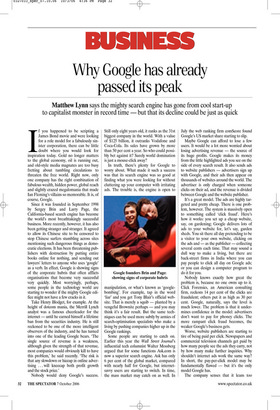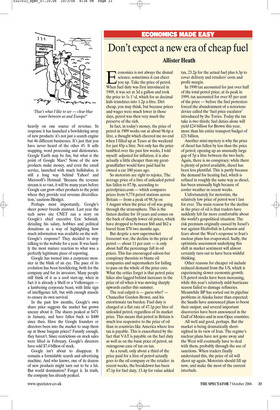Why Google has already passed its peak
Matthew Lynn says the mighty search engine has gone from cool start-up to capitalist monster in record time — but that its decline could be just as quick If you happened to be scripting a James Bond movie and were looking for a role model for a fabulously sinister corporation, there can be little doubt where you would look for inspiration today. Gold no longer matters to the global economy, oil is running out, and old-style media magnates are too busy fretting about tumbling circulations to threaten the free world. Right now, only one company has the right combination of fabulous wealth, hidden power, global reach and slightly crazed megalomania that made Ian Fleming’s villains so memorable. It is, of course, Google.
Since it was founded in September 1998 by Sergey Brin and Larry Page, the California-based search engine has become the world’s most breathtakingly successful business. More recently, however, it has also been getting stranger and stranger. It agreed to allow its Chinese site to be censored to stop Chinese surfers stumbling across sites mentioning such dangerous things as democratic elections. It has been threatening publishers with destruction by putting entire books online for nothing, and sending out lawyers’ letters to anyone who uses ‘google’ as a verb. In effect, Google is showing signs of the corporate hubris that often afflicts organisations that become very successful very quickly. Most worryingly, perhaps, some people in the technology world are starting to wonder if the mighty Google edifice might not have a few cracks in it.
Take Henry Blodget, for example. At the height of dotcom mania, the Merrill Lynch analyst was a famous cheerleader for the internet — until he earned himself a lifetime ban from the securities industry. He is still reckoned to be one of the more intelligent observers of the industry, and he has turned into one of the leading Google bears. ‘The single source of revenue is a weakness, although given the strength of that revenue, most companies would obviously kill to have this problem,’ he said recently. ‘The risk is that any slowdown or hiccup in online advertising ... will kneecap both profit growth and the stock price.’ Nobody would deny Google’s success. Still only eight years old, it ranks as the 31st biggest company in the world. With a value of $125 billion, it outranks Vodafone and Coca-Cola. Its sales have grown by more than 50 per cent a year. So who could possibly bet against it? Surely world domination is just a mouse-click away?
In truth, there’s plenty for Google to worry about. What made it such a success was that its search engine was so good at finding what you were looking for without cluttering up your computer with irritating ads. The trouble is, the engine is open to manipulation, or what’s known as ‘googlebombing’. For example, tap in the word ‘liar’ and you get Tony Blair’s official website. That is merely a squib — planted by a vengeful Brownite perhaps — and you may think it’s a fair result. But the same techniques can be used more subtly by armies of search-optimisation specialists who make a living by pushing companies higher up in the Google rankings.
Some people are starting to catch on. Earlier this year the Wall Street Journal’s influential tech columnist Walter Mossberg argued that for some functions Ask.com is now a superior search engine. Ask has only 6 per cent of the global market, compared with nearly half for Google, but internetsavvy users are starting to switch. In time, the mass market may catch on as well. In July the web ranking firm comScore found Google’s US market share starting to slip.
Maybe Google can afford to lose a few users. It would be a lot more worried about losing advertising revenue — the source of its huge profits. Google makes its money from the little highlighted ads you see on the side of every search result. It also sends ads to website publishers — advertisers sign up with Google, and their ads then appear on thousands of websites around the world. The advertiser is only charged when someone clicks on their ad, and the revenue is divided between Google and the website publisher.
It’s a great model. The ads are highly targeted and pretty cheap. There is one problem, however. The system is massively open to something called ‘click fraud’. Here’s how it works: you set up a cheap website, say, on gardening; Google delivers lots of ads to your website for, let’s say, garden sheds. You sit there all day pretending to be a visitor to your own website, clicking on the ads and — as the publisher — collecting several cents each time. That may sound a dull way to make a living, but there are back-street firms in India where you can pay people to click all day on Google ads; or you can design a computer program to do it for you.
Nobody knows exactly how great the problem is, because no one owns up to it. Click Forensics, an American consulting firm, reckons 14 per cent of the clicks are fraudulent; others put it as high as 30 per cent. Google, naturally, says the level is much lower. The problem is that it undermines confidence in the model: advertisers don’t want to pay for phoney clicks. The more rampant click fraud becomes, the weaker Google’s business gets.
Worse, website publishers are starting to tire of being paid per click. Newspapers and commercial television channels get paid by how many people see the ads they carry, not by how many make further inquiries. Why shouldn’t internet ads work the same way? In short, the pay-per-click model may be fundamentally flawed — but it’s the only model Google has.
The company senses that it leans too heavily on one source of revenue. In response it has launched a bewildering array of new products: it’s not just a search engine but 46 different businesses. It’s just that you have never heard of the other 45. It sells mapping, word processing and dictionaries. Google Earth may be fun, but what is the point of Google Mars? None of the new products make money, and even the email service, launched with much hullabaloo, is still a long way behind Yahoo! and Microsoft’s Hotmail. ‘Because the revenue stream is so vast, it will be many years before Google can grow other products to the point where they provide real revenue diversification,’ cautions Blodget.
Perhaps most importantly, Google’s sheer power breeds mistrust. Last year the tech news site CNET ran a story on Google’s chief executive Eric Schmidt, detailing his salary, hobbies and political donations as a way of highlighting how much information was available on the web. Google’s response? They decided to stop talking to the website for a year. It was hardly the most mature reaction to what was a perfectly legitimate piece of reporting.
Google has turned into a corporate monster in the blink of an eye. The pace of its evolution has been bewildering, both for the company and for its investors. Many people still think of it as a cool start-up, when in fact it is already a Shell or a Volkswagen a lumbering corporate beast, with little sign of intelligence left, but with enough muscle to ensure its own survival.
In the past few months, Google’s own share price suggests the market has grown uneasy about it. The shares peaked at $471 in January, and have fallen back to $400 since then. Have the Google founders or directors been into the market to snap them up at those bargain prices? Funnily enough, they haven’t. Since restrictions on stock sales were lifted in February, Google’s directors have sold $7.4 billion of stock.
Google isn’t about to disappear. It remains a formidable search and advertising machine. And who knows, one of its dozens of new products might turn out to be a hit. But world domination? Forget it. In truth, the company has already peaked.



















































































 Previous page
Previous page